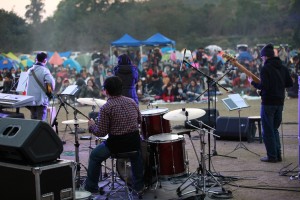For Yuen Chi-chung, a music critic and organiser of Freespace Fest, a music festival is like a buffet – there is always something for everyone. “The freedom you get in a music festival is what really makes it tick,” says Yuen. “Even if you don’t like the music, you can always go eat or drink a beer or two.”
The performances are as diverse as the range of activities available, from classic rock and roll to blues, to hip-hop and electro. All genres of music are welcome with the only exception being mainstream pop. Yuen cites the controversy which arose over the inclusion of Cantopop singer G.E.M. in the Clockenflap line-up last year as evidence of the antipathy to pop.
Clockenflap was started by three Britons living in Hong Kong. Inspired by international festivals like Glastonbury, it is the biggest music and arts festival in Hong Kong and aims to introduce overseas music and alternative art such as silent discos, installation art and film tents to the city.
“Audiences go to Clockenflap because they want to see overseas independent bands like Franz Ferdinand or Black Rebel Motorcycle Club,” says Yuen. “Having mainstream singers twists the nature of music festivals.”
Even though more open venues are now readily available, not all are suitable for music festivals. Concerts and music festivals were barred from the Hong Kong Stadium after a few gigs because they disturbed nearby residents. And Yuen recalls it took years of trial and error to figure out where to place the performance stages at the West Kowloon Cultural District in order to minimise noise to surrounding residents.
Thickest Choi Chi-hau, founder of Grasscamp, has learnt the hard way that the weather can be a nuisance too. Choi had to cut short an outdoor festival at West Kowloon last December due to an unexpected winter downpour.
Unwilling to let his efforts go down the drain, Choi re-launched Grasscamp on the Ma Tso Lung Campsite in Sheung Shui in early January. At short notice, he scrambled together a list of 10 local independent acts. He also set up an online crowdfunding campaign and raised close to HK$30,000 in less than a month. As the event was free of charge, Choi admits he is unlikely to break even as the cost of putting on the event was closer to HK$80,000. Nevertheless, he was overwhelmed by the support of music lovers.
To go with the new location, Choi thought of incorporating local elements in the event. This proved to be easy as the local Kwu Tung villagers readily agreed to provide traditional Chinese snacks such as tea eggs and rice flour puddings for sale. “Seeing as we were already there, it was best if we benefitted the local villagers,” says Choi.
Amateur singer-songwriter and history teacher, “Chu Sir”, even volunteered to perform his self-penned folk songs at breakfast. The sometimes humorous lyrics told of the history of the local area.

“When people think of , Sheung Shui and Fanling they mostly think about parallel goods traders. But there is more than that,” says Choi. “The context here [Ma Tso Lung] is unlike West Kowloon. West Kowloon is just a plain field whereas here there is a lot of history and culture. Therefore I wanted to accomplish more than entertainment.”
Things turned out better than Choi ever expected. Over 1,000 people showed up over the two-day event, with 300 camped out overnight despite an overnight temperature of four degrees Celsius.







































